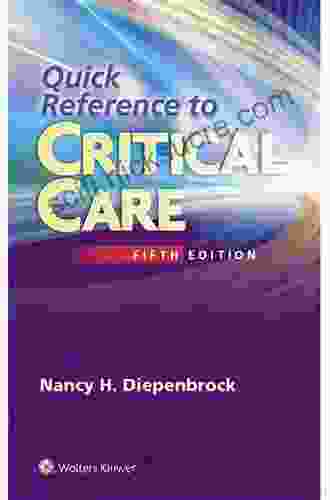A Comprehensive Quick Reference for Critical Care: Essential Knowledge at Your Fingertips

In the fast-paced and demanding environment of critical care, having instant access to reliable information can be life-saving. This article serves as a comprehensive quick reference for critical care, providing essential knowledge, management strategies, and evidence-based practices to empower healthcare professionals in providing the best possible care for critically ill patients.
4.8 out of 5
| Language | : | English |
| File size | : | 124426 KB |
| Text-to-Speech | : | Enabled |
| Enhanced typesetting | : | Enabled |
| Print length | : | 528 pages |
| Screen Reader | : | Supported |
| X-Ray for textbooks | : | Enabled |
1. Assessment and Monitoring
- Vital Signs: Assess and monitor vital signs, including heart rate, blood pressure, respiratory rate, temperature, and oxygen saturation, to detect any abnormalities.
- Neurological Assessment: Conduct a thorough neurological assessment to evaluate consciousness, pupillary response, motor function, and reflexes.
- Respiratory Assessment: Assess respiratory rate, depth, and effort. Note any signs of respiratory distress, such as retractions, wheezing, or cyanosis.
- Cardiovascular Assessment: Evaluate heart rate, rhythm, and blood pressure. Auscultate the heart for any murmurs or abnormal sounds.
- Renal Assessment: Monitor urine output, electrolytes, and creatinine levels to assess kidney function.
2. Respiratory Management
- Oxygen Therapy: Administer oxygen therapy as indicated to maintain adequate oxygen saturation levels.
- Mechanical Ventilation: Initiate mechanical ventilation when necessary to support respiratory function and maintain oxygenation.
- Chest Tube Insertion: Perform chest tube insertion to remove air or fluid from the pleural space and re-expand the lungs.
- Pulmonary Embolism Management: Treat pulmonary embolism with anticoagulants and thrombolytic therapy.
- ARDS (Acute Respiratory Distress Syndrome) Management: Provide supportive care and mechanical ventilation to manage ARDS.
3. Cardiovascular Management
- Cardiopulmonary Resuscitation (CPR): Perform CPR in the event of cardiac arrest.
- Defibrillation: Administer defibrillation to terminate ventricular fibrillation or pulseless ventricular tachycardia.
- Vasopressor Therapy: Administer vasopressors to increase blood pressure and improve tissue perfusion.
- Antiarrhythmic Therapy: Administer antiarrhythmic medications to control abnormal heart rhythms.
- Pacemaker Insertion: Insert a pacemaker to regulate heart rate and rhythm.
4. Neurological Management
- Seizure Management: Administer anticonvulsant medications to control seizures.
- Intracranial Pressure (ICP) Monitoring: Monitor ICP using an intracranial pressure monitor.
- Intracranial Hemorrhage Management: Manage intracranial hemorrhage through surgical intervention or conservative treatment.
- Stroke Management: Provide supportive care and thrombolytic therapy for stroke patients.
- Traumatic Brain Injury Management: Implement guidelines for managing traumatic brain injuries.
5. Renal Management
- Fluid Management: Monitor and manage fluid balance to maintain electrolyte balance and prevent fluid overload or dehydration.
- Hemodialysis and Peritoneal Dialysis: Initiate renal replacement therapy if necessary to support kidney function.
- Acute Kidney Injury (AKI) Management: Provide supportive care and monitor for complications of AKI.
- Urinary Tract Infection (UTI) Management: Treat UTIs with appropriate antibiotics.
- Renal Transplantation: Consider renal transplantation as a treatment option for end-stage renal disease.
6. Gastrointestinal Management
- Nasogastric Tube Insertion: Insert a nasogastric tube for decompression and nutritional support.
- Nutritional Support: Provide nutritional support through enteral or parenteral nutrition.
- Peptic Ulcer Disease Management: Treat peptic ulcer disease with acid suppressors and antibiotics.
- Bowel Obstruction Management: Provide conservative or surgical treatment for bowel obstructions.
- Gastrointestinal Bleeding Management: Resuscitate and manage patients with gastrointestinal bleeding.
7. Endocrine Management
- Hyperglycemia and Hypoglycemia Management: Monitor and manage glucose levels to prevent complications.
- Thyroid Disorders Management: Treat thyroid disorders appropriately with medications or surgical intervention.
- Adrenal Insufficiency Management: Provide hormone replacement therapy for patients with adrenal insufficiency.
- Pituitary Disorders Management: Treat pituitary disorders with medications or surgical intervention.
- Electrolyte Imbalances Management: Correct electrolyte imbalances promptly to prevent life-threatening complications.
8. Infection Control and Prevention
- Isolation Precautions: Implement isolation precautions based on the type of infection to prevent its spread.
- Hand Hygiene: Emphasize the importance of proper hand hygiene to reduce the risk of infection.
- Antibiotic Therapy: Prescribe antibiotics appropriately to treat infections and prevent antimicrobial resistance.
- Sepsis Management: Recognize and manage sepsis promptly to improve outcomes.
- Infection Prevention Guidelines: Follow current infection prevention guidelines to minimize the risk of hospital-acquired infections.
9. Ethical Considerations
- End-of-Life Care: Provide compassionate end-of-life care, respecting patient autonomy and preferences.
- Decision-Making Capacity: Assess decision-making capacity and involve patients in decisions regarding their care.
- Withholding and Withdrawing Treatment: Discuss the ethical implications of withholding or withdrawing treatment.
- Organ Donation: Facilitate organ donation in accordance with patient wishes and ethical guidelines.
- Advanced Directives: Respect patient advance directives and follow ethical guidelines for their implementation.
This comprehensive quick reference for critical care provides a concise summary of essential knowledge and management strategies for critically ill patients. By incorporating these guidelines into practice, healthcare professionals can enhance patient outcomes, improve communication, and ensure the highest quality of care in the critical care setting. Remember, this is only a reference guide, and specific patient care decisions should be made in consultation with the patient's healthcare team and based on their unique needs and circumstances.
4.8 out of 5
| Language | : | English |
| File size | : | 124426 KB |
| Text-to-Speech | : | Enabled |
| Enhanced typesetting | : | Enabled |
| Print length | : | 528 pages |
| Screen Reader | : | Supported |
| X-Ray for textbooks | : | Enabled |
Do you want to contribute by writing guest posts on this blog?
Please contact us and send us a resume of previous articles that you have written.
 Fiction
Fiction Non Fiction
Non Fiction Romance
Romance Mystery
Mystery Thriller
Thriller SciFi
SciFi Fantasy
Fantasy Horror
Horror Biography
Biography Selfhelp
Selfhelp Business
Business History
History Classics
Classics Poetry
Poetry Childrens
Childrens Young Adult
Young Adult Educational
Educational Cooking
Cooking Travel
Travel Lifestyle
Lifestyle Spirituality
Spirituality Health
Health Fitness
Fitness Technology
Technology Science
Science Arts
Arts Crafts
Crafts DIY
DIY Gardening
Gardening Petcare
Petcare Sandra Brown
Sandra Brown Katherine A Dettwyler
Katherine A Dettwyler Derek Johnson
Derek Johnson Robert T Kiyosaki
Robert T Kiyosaki Nicholas Bjorn
Nicholas Bjorn Ronald D Mcelroy
Ronald D Mcelroy Loralee Leavitt
Loralee Leavitt Jimmy Cornell
Jimmy Cornell Jack Henderson
Jack Henderson Chris Cheng
Chris Cheng Wendy Suzuki
Wendy Suzuki Michael Hoy
Michael Hoy Susanna Heli
Susanna Heli Carol A Dahir
Carol A Dahir Michael Inden
Michael Inden Selma H Fraiberg
Selma H Fraiberg Frank Giampaolo
Frank Giampaolo Robert Courland
Robert Courland Jody Hedlund
Jody Hedlund Linda Fairley
Linda Fairley Bob Harig
Bob Harig Zola Levitt
Zola Levitt Jimmy Roberts
Jimmy Roberts Collegiate Learning
Collegiate Learning Graham Denton
Graham Denton James Kaiser
James Kaiser Peter N Peregrine
Peter N Peregrine Kindle Edition
Kindle Edition Lisa Mckay
Lisa Mckay Guy Gavriel Kay
Guy Gavriel Kay 1st Ed 2019 Edition Kindle Edition
1st Ed 2019 Edition Kindle Edition John Gierach
John Gierach Elizabeth Hay
Elizabeth Hay Richard J Foster
Richard J Foster Tiffany Vincent
Tiffany Vincent Brendan Donley
Brendan Donley Bill Nason
Bill Nason Culture Smart
Culture Smart Pamela A Hays
Pamela A Hays Lianna Marie
Lianna Marie Tobias Macey
Tobias Macey Jen Rose Smith
Jen Rose Smith Ricardo Pompa
Ricardo Pompa Logan Thompson
Logan Thompson Bridie Gallagher
Bridie Gallagher Tracy Moore
Tracy Moore Derek Cheung
Derek Cheung Huan Yang
Huan Yang Julie Kratz
Julie Kratz Harmon Cooper
Harmon Cooper Leigh Calvez
Leigh Calvez Timothy Alberino
Timothy Alberino Kelly Koerner
Kelly Koerner Nancy H Diepenbrock
Nancy H Diepenbrock Michael R Canfield
Michael R Canfield Ed Viesturs
Ed Viesturs Pedro Urvi
Pedro Urvi Alan Anderson
Alan Anderson Bob Meehan
Bob Meehan Jason Brown
Jason Brown Richard Bach
Richard Bach Philip Kramer
Philip Kramer Kevin Williams
Kevin Williams Lynn A Struve
Lynn A Struve Lily Field
Lily Field Rachel Marie Martin
Rachel Marie Martin Karen George
Karen George Stephen Armstrong
Stephen Armstrong Nfhs
Nfhs Kathryn Mcelroy
Kathryn Mcelroy Lee Mcintyre
Lee Mcintyre Kazumi Tabata
Kazumi Tabata Stuart Firestein
Stuart Firestein David Franklin
David Franklin Doris Pilkington
Doris Pilkington Grace Elizabeth Hale
Grace Elizabeth Hale Rand Cardwell
Rand Cardwell William R Miller
William R Miller Jane Watkins
Jane Watkins Bradley Mayhew
Bradley Mayhew Theodore Dalrymple
Theodore Dalrymple Francis Jonah
Francis Jonah Julietta Suzuki
Julietta Suzuki Donald Hanley
Donald Hanley Lieven Vandenberghe
Lieven Vandenberghe Joni Levine
Joni Levine Tania Aebi
Tania Aebi Jim Murphy
Jim Murphy Sheila Willcox
Sheila Willcox Philip Slayton
Philip Slayton Christopher Setterlund
Christopher Setterlund Brian Libby
Brian Libby Dinesh Kumar Goyal
Dinesh Kumar Goyal Philip A Moore
Philip A Moore Elizabeth Bishop
Elizabeth Bishop Jared Hargrave
Jared Hargrave Eric R Dodge
Eric R Dodge Becca Anderson
Becca Anderson Lou Kasischke
Lou Kasischke Peter Nabokov
Peter Nabokov Simeon Wright
Simeon Wright Zecharia Sitchin
Zecharia Sitchin Kristin Plain
Kristin Plain Jennifer Mccully
Jennifer Mccully Jacqueline Kelleher
Jacqueline Kelleher James Mooney
James Mooney Su Ad Abdul Khabeer
Su Ad Abdul Khabeer George G Morgan
George G Morgan Melissa Gomes
Melissa Gomes Paddy Ashdown
Paddy Ashdown Phillip Stephen Schulz
Phillip Stephen Schulz Luke Humphrey
Luke Humphrey Ceara Comeau
Ceara Comeau Craig Callender
Craig Callender Elena Kryuchkova
Elena Kryuchkova Jacob Paul Patchen
Jacob Paul Patchen Bob Morris
Bob Morris James R Evans
James R Evans Raghuram Rajan
Raghuram Rajan Kevin Ticen
Kevin Ticen James Atkinson
James Atkinson Nikki Glandon
Nikki Glandon Paula Petrella
Paula Petrella Cal Pater
Cal Pater Jason R Briggs
Jason R Briggs Michele Riva
Michele Riva George Heineman
George Heineman Daniel Friebe
Daniel Friebe Megan Miller
Megan Miller Matt Harrison
Matt Harrison Tom Mccoy
Tom Mccoy John Skinner
John Skinner Fred Medina
Fred Medina Michael Loynd
Michael Loynd Sally Moran
Sally Moran Nurse Academy
Nurse Academy Staff Of The Harvard Crimson
Staff Of The Harvard Crimson Roger Kopanycia
Roger Kopanycia Alan Pearce
Alan Pearce Django Wexler
Django Wexler Matthew Cronin
Matthew Cronin David Sammel
David Sammel David Christian
David Christian Bill Nowlin
Bill Nowlin Matt Davids
Matt Davids Sleiman Azizi
Sleiman Azizi Robert Farris Thompson
Robert Farris Thompson Kiera Cass
Kiera Cass Steven A Finkler
Steven A Finkler Rob Walker
Rob Walker Detlev Piltz
Detlev Piltz Felix Bittmann
Felix Bittmann Rod Baker
Rod Baker Melissa Marr
Melissa Marr Bruce Sutherland
Bruce Sutherland Brian Zepka
Brian Zepka Marc Silver
Marc Silver Three Over Eight Learning
Three Over Eight Learning James Mcmullan
James Mcmullan Monica Gribben
Monica Gribben House Of Talent
House Of Talent Scarlett Thomas
Scarlett Thomas Sam Dogra
Sam Dogra Diondre Mompoint
Diondre Mompoint Robert Young Pelton
Robert Young Pelton Silvan S Schweber
Silvan S Schweber Iskcon Revival Movement
Iskcon Revival Movement Curt Sampson
Curt Sampson Lewis Howes
Lewis Howes N M J Woodhouse
N M J Woodhouse Greg Wolfe
Greg Wolfe Dan Hamilton
Dan Hamilton Kevin C Kelleher Md Md
Kevin C Kelleher Md Md Lori Foster
Lori Foster Michelle Garnett
Michelle Garnett Gordon H Chang
Gordon H Chang John Sabino
John Sabino Scott Waldie
Scott Waldie Eduardo Montano
Eduardo Montano Jill Margaret Shulman
Jill Margaret Shulman Scott Wilson
Scott Wilson Lola Glass
Lola Glass Art Smith
Art Smith National Fastpitch Coaches Association
National Fastpitch Coaches Association Ian Tuhovsky
Ian Tuhovsky Bob Motley
Bob Motley Sergey K Aityan
Sergey K Aityan Robert Fisher
Robert Fisher Mones Abu Asab
Mones Abu Asab Roland Nyns
Roland Nyns Stephanie J Scott
Stephanie J Scott J M Hofer
J M Hofer Tiffany Loggins Psyd
Tiffany Loggins Psyd Taste Of Home
Taste Of Home Mia Reyes
Mia Reyes Lewis Morris
Lewis Morris Print Replica Kindle Edition
Print Replica Kindle Edition Lynn E Ponton
Lynn E Ponton James Morgan Ayres
James Morgan Ayres Robert T Pennock
Robert T Pennock Julie Dubrouillet
Julie Dubrouillet Kenneth C Roebuck
Kenneth C Roebuck Greg Mcmillan
Greg Mcmillan Sigmund Freud
Sigmund Freud Jennifer L Lopez
Jennifer L Lopez Sylvia Mercedes
Sylvia Mercedes Diane Ehrensaft
Diane Ehrensaft Dan Gable
Dan Gable James Oseland
James Oseland Peter Mcdougall
Peter Mcdougall William Spencer
William Spencer Aaron Oster
Aaron Oster Tania Marshall
Tania Marshall Marion Zimmer Bradley
Marion Zimmer Bradley Immigration Consult
Immigration Consult Gary Letcher
Gary Letcher Elena Lawson
Elena Lawson Hettie Brittz
Hettie Brittz Dr Ray Makar
Dr Ray Makar Rachel Burgess
Rachel Burgess Breann Blehm
Breann Blehm Laura J Snyder
Laura J Snyder Pat Harvey
Pat Harvey Nicole Howard
Nicole Howard Clinton Dobbins
Clinton Dobbins Charles Hooton
Charles Hooton Lyn Millner
Lyn Millner Luke Jackson
Luke Jackson Peter Ralston
Peter Ralston Jim Wilson
Jim Wilson Carrie Rogers Whitehead
Carrie Rogers Whitehead Lowell Skoog
Lowell Skoog Jessica Mayer Koren
Jessica Mayer Koren Rinoa
Rinoa Glen Mourning
Glen Mourning 1st Ed 2021 Edition Kindle Edition
1st Ed 2021 Edition Kindle Edition L Waxy Gregoire
L Waxy Gregoire Sharon M Ravitch
Sharon M Ravitch Diane Ravitch
Diane Ravitch Angela Stevens
Angela Stevens Mike Evans
Mike Evans Julie Des Jardins
Julie Des Jardins Martin Toms
Martin Toms Darwin V Ellis
Darwin V Ellis Barry Lewis
Barry Lewis Luisa Magarian
Luisa Magarian Cliff Jacobson
Cliff Jacobson Terri Jean
Terri Jean Matthias Biehl
Matthias Biehl Laurence D Houlgate
Laurence D Houlgate John Mccollister
John Mccollister Michael Kulikowski
Michael Kulikowski Charmaine Mckissock
Charmaine Mckissock Gregg Michaelsen
Gregg Michaelsen Antti Laaksonen
Antti Laaksonen William Shakespeare
William Shakespeare Jeff Carreira
Jeff Carreira Marc P Steinberg
Marc P Steinberg Norm Flayderman
Norm Flayderman Christine Lion
Christine Lion Lynn Rosen
Lynn Rosen Jack Whyte
Jack Whyte Leo Baker
Leo Baker Yaron Seidman
Yaron Seidman Martin Gardner
Martin Gardner Tehlor Kay Mejia
Tehlor Kay Mejia Jane Adams
Jane Adams Fiona Danks
Fiona Danks Sifu Slim
Sifu Slim Paul Bellow
Paul Bellow Dave Pine
Dave Pine Ruth M Tappen
Ruth M Tappen Mami Wata
Mami Wata Kim Heldman
Kim Heldman Lewis Smile
Lewis Smile Karen Le Billon
Karen Le Billon Jerry A Coyne
Jerry A Coyne Lawrence M Krauss
Lawrence M Krauss Gao Yisheng
Gao Yisheng Mantak Chia
Mantak Chia Corinne Brown
Corinne Brown Charles Johnson
Charles Johnson Asaf Rozanes
Asaf Rozanes Haruki Murakami
Haruki Murakami Bruce Kershner
Bruce Kershner Bob Thomas
Bob Thomas Brook Waters
Brook Waters Catherine Ryan Gregory
Catherine Ryan Gregory Fr Vincent Lampert
Fr Vincent Lampert David Murray
David Murray Jack Cavanaugh
Jack Cavanaugh Bob Miller
Bob Miller Holly Black
Holly Black Malcolm Williams
Malcolm Williams Hugh Marriott
Hugh Marriott Oluwatosin Adebanjo Ore
Oluwatosin Adebanjo Ore Ed Palattella
Ed Palattella Karen Ehman
Karen Ehman Xiran Jay Zhao
Xiran Jay Zhao Sian O Gorman
Sian O Gorman Mahzarin R Banaji
Mahzarin R Banaji Borja Loma Barrie
Borja Loma Barrie Joe Tasker
Joe Tasker James Lovegrove
James Lovegrove Blessing Agunloye
Blessing Agunloye Brad Walker
Brad Walker Steve Leonard
Steve Leonard Second Edition New Edition Updated Revised...
Second Edition New Edition Updated Revised... Carol Mccloud
Carol Mccloud Steven Trustrum
Steven Trustrum Richard Grant
Richard Grant Bradley Garrett
Bradley Garrett Ed Gruver
Ed Gruver Bob Brister
Bob Brister Shane Burcaw
Shane Burcaw Joe Hendershott
Joe Hendershott Monica Mcgoldrick
Monica Mcgoldrick Julia Shaw
Julia Shaw Julia Englund Strait Phd
Julia Englund Strait Phd Ted Kerasote
Ted Kerasote Carlo Zen
Carlo Zen Michael Conway
Michael Conway David Wescott
David Wescott Mary Beard
Mary Beard William Pitts
William Pitts Christian Smith
Christian Smith Theodore Gray
Theodore Gray Jakub Marian
Jakub Marian Joseph Campbell
Joseph Campbell Chantal Sicile Kira
Chantal Sicile Kira Tracy Deonn
Tracy Deonn Raymond Barrett
Raymond Barrett David Seidman
David Seidman Dan Wowak
Dan Wowak Daniel Isberner
Daniel Isberner Jorge Croda
Jorge Croda Nando Parrado
Nando Parrado Smart Reads
Smart Reads Dr Aviva Legatt
Dr Aviva Legatt Tony Hansen
Tony Hansen Larry Pardey
Larry Pardey Jessica Holsman
Jessica Holsman John Andrisani
John Andrisani Eva Ibbotson
Eva Ibbotson Karen Gershowitz
Karen Gershowitz Nick Muxlow
Nick Muxlow Mathew Tekulsky
Mathew Tekulsky Tim Swanwick
Tim Swanwick Diane Sticks Harsha
Diane Sticks Harsha Rick Sapp
Rick Sapp Deirdre A Scaggs
Deirdre A Scaggs Tom Bisio
Tom Bisio Randall M Rueff
Randall M Rueff Bob Gaines
Bob Gaines Bobbi Conner
Bobbi Conner Chuck Carlson
Chuck Carlson Zach Alexander
Zach Alexander Tom Stienstra
Tom Stienstra Jennifer Boyle
Jennifer Boyle Booksumo Press
Booksumo Press Cindy C Bennett
Cindy C Bennett United States Government Us Army
United States Government Us Army Robin Moore
Robin Moore Tao Le
Tao Le Terry Mcmillan
Terry Mcmillan 1st Edition Kindle Edition
1st Edition Kindle Edition Emma Fick
Emma Fick Janet Evanovich
Janet Evanovich Candace Walsh
Candace Walsh Leah Hager Cohen
Leah Hager Cohen Jason Thalken
Jason Thalken Jayne Storey
Jayne Storey Brittany Noelle
Brittany Noelle George M Church
George M Church Robert J Sternberg
Robert J Sternberg N L Mclaughlin
N L Mclaughlin Dr Barbara Sorrels
Dr Barbara Sorrels Fran Davis
Fran Davis Paul Orland
Paul Orland Helen Corcoran
Helen Corcoran S Connolly
S Connolly Sevki Kuruoglu
Sevki Kuruoglu Hecateus Apuliensis
Hecateus Apuliensis Jennifer Pastiloff
Jennifer Pastiloff Jodi Magness
Jodi Magness Nate Schweber
Nate Schweber Jill Krause
Jill Krause Josephine Diebitsch Peary
Josephine Diebitsch Peary Bob Forman
Bob Forman Jennifer Niven
Jennifer Niven Brenda Hiatt
Brenda Hiatt Mary J Macleod
Mary J Macleod Don Currie
Don Currie Richard Williams
Richard Williams David Mayer
David Mayer Russell Bryant
Russell Bryant Summer Batte
Summer Batte Richard Headstrom
Richard Headstrom Camille Soulier
Camille Soulier Jim Thompson
Jim Thompson Kayvan Shokrollahi
Kayvan Shokrollahi Daphne Adler
Daphne Adler Haider Warraich
Haider Warraich Cecilia Chrapkowska
Cecilia Chrapkowska John Horgan
John Horgan Marley Dias
Marley Dias Peter Byrne
Peter Byrne James Duggan
James Duggan Serena Williams
Serena Williams Language Guru
Language Guru Mark E Johnson
Mark E Johnson Katherine Roberts
Katherine Roberts Sacha Koborsi Tadros
Sacha Koborsi Tadros Jeannie Tyrrell
Jeannie Tyrrell Jennie Naidoo
Jennie Naidoo Priscilla T Brown
Priscilla T Brown Michael Kodas
Michael Kodas Connecticut Forest And Park Association
Connecticut Forest And Park Association Tara Lazar
Tara Lazar Rohan Agarwal
Rohan Agarwal Cheryl Marlene
Cheryl Marlene David L Cook
David L Cook Teresa Denton
Teresa Denton Jerry Darkes
Jerry Darkes 1st Ed 2020 Edition Kindle Edition
1st Ed 2020 Edition Kindle Edition Maia Weinstock
Maia Weinstock Jonathan Howard Md
Jonathan Howard Md Sherman Alexie
Sherman Alexie Fodor S Travel Guides
Fodor S Travel Guides Daniel Kahneman
Daniel Kahneman Ross Mccluney
Ross Mccluney Christie Aschwanden
Christie Aschwanden Laura Freberg
Laura Freberg Patrisia Gonzales
Patrisia Gonzales Maggie Smith
Maggie Smith Lisa Takeuchi Cullen
Lisa Takeuchi Cullen David Cockburn
David Cockburn Herbert Wolverson
Herbert Wolverson Mark W Gaither
Mark W Gaither Mark Vonnegut
Mark Vonnegut Ziya Tong
Ziya Tong Joanna Breyer
Joanna Breyer Mark Rashid
Mark Rashid Charles H Townes
Charles H Townes Michael Eric Dyson
Michael Eric Dyson Ron Woldoff
Ron Woldoff John V Petrocelli
John V Petrocelli Shaana Berman
Shaana Berman Tom Billinge
Tom Billinge
Light bulbAdvertise smarter! Our strategic ad space ensures maximum exposure. Reserve your spot today!

 Theodore MitchellMastering Spanish: Essential Reading and Translation Practice for Language...
Theodore MitchellMastering Spanish: Essential Reading and Translation Practice for Language... Danny SimmonsFollow ·12.8k
Danny SimmonsFollow ·12.8k Henry GreenFollow ·5.6k
Henry GreenFollow ·5.6k Charles BukowskiFollow ·12.2k
Charles BukowskiFollow ·12.2k Noah BlairFollow ·14.4k
Noah BlairFollow ·14.4k Nathaniel PowellFollow ·9.2k
Nathaniel PowellFollow ·9.2k Ike BellFollow ·13.9k
Ike BellFollow ·13.9k Derek BellFollow ·12.7k
Derek BellFollow ·12.7k Everett BellFollow ·19.8k
Everett BellFollow ·19.8k

 Dennis Hayes
Dennis HayesMystic Legend and His Epic Crusade Into the New World: A...
The story of Mystic Legend is...

 Braden Ward
Braden WardThe Wandering Fire: A Captivating Fantasy Epic in the...
: A Realm of Enchantment and...

 Nathaniel Hawthorne
Nathaniel HawthorneStarstruck Brenda Hiatt: A Journey to Stardom
Brenda Hiatt's journey to...

 Clark Campbell
Clark Campbell50 Enchanting Towns and Cities for Your Fantasy Tabletop...
Are you a dungeon master looking for the...

 W.B. Yeats
W.B. Yeats15 Natural Ways to Fix PCOS (Polycystic Ovary Syndrome)
Polycystic ovary syndrome (PCOS) is a hormonal...
4.8 out of 5
| Language | : | English |
| File size | : | 124426 KB |
| Text-to-Speech | : | Enabled |
| Enhanced typesetting | : | Enabled |
| Print length | : | 528 pages |
| Screen Reader | : | Supported |
| X-Ray for textbooks | : | Enabled |











